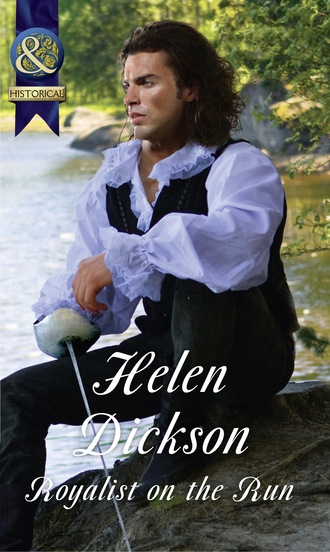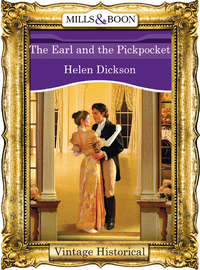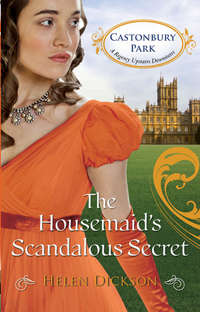
Полная версия
Royalist On The Run

‘Arabella … Any minute now I may forget that I shouldn’t be here, alone with you.’
‘Please don’t go.’
At that unequivocal invitation, without restraint he closed the distance between them. His arms curled around her and once again she felt the immense thrill of being held against him. She was overcome by a passionate desire to surrender herself to him.
As his lips touched hers, despite the roughness of his beard which brushed her face, a sharp intake of breath betrayed her longing for him. The force between them had grown powerful and impatient, and the longing could no longer be denied.
Author Note
The English Civil War in the seventeenth century, which saw almost ten years of conflict, upset the lives of people in England profoundly—and in ways they could not have envisaged. There were strong differences of opinion, and those loyal to the King found the concept of a country without a monarch at the head of its social order virtually unimaginable.
The war saw the execution of a king, followed by the establishment of a military dictatorship under Oliver Cromwell. It gave rise to new ideas, political and religious, but following years of repression and the death of Cromwell the people called for the monarchy to be restored.
I have always been fascinated by this time, and have chosen to focus this story on the Royalist cause, with my hero and heroine on the same side.
Royalist on the Run
Helen Dickson

www.millsandboon.co.uk
HELEN DICKSON was born and still lives in South Yorkshire, with her retired farm manager husband. Having moved out of the busy farmhouse where she raised their two sons, she has more time to indulge in her favourite pastimes. She enjoys being outdoors, travelling, reading and music. An incurable romantic, she writes for pleasure. It was a love of history that drove her to writing historical fiction.
MILLS & BOON
Before you start reading, why not sign up?
Thank you for downloading this Mills & Boon book. If you want to hear about exclusive discounts, special offers and competitions, sign up to our email newsletter today!
SIGN ME UP!
Or simply visit
signup.millsandboon.co.uk
Mills & Boon emails are completely free to receive and you can unsubscribe at any time via the link in any email we send you.
Contents
Cover
Introduction
Author Note
Title Page
About the Author
Chapter One
Chapter Two
Chapter Three
Chapter Four
Chapter Five
Chapter Six
Chapter Seven
Chapter Eight
Chapter Nine
Chapter Ten
Epilogue
Extract
Copyright
Chapter One
Arabella couldn’t say if it was the children crying in the room next to hers that woke her, the hard-edged rain pelting the windowpanes that sounded like stones, or a shutter banging against a wall in the far reaches of the house.
Opening her eyes, she listened to the wind blowing and moaning like a tortured soul over the land. She prayed the shutter wouldn’t blow off. And then she realised what it was that had disturbed her—the rhythmic beat of horses’ hooves approaching the house.
Soldiers. Who else could it be?
Closing her eyes, with foreboding in her heart she prayed they weren’t about to have a repeat of what had happened in the past, when Parliamentary soldiers had sacked the house.
‘Are the vultures about to gather again?’ she muttered, knowing she should pray hard and fast that it was not so, but she was too weary to do what had proved useless in the past. With her heart racing and shivering with cold, she got out of bed and went to the window and looked out. Rain was falling hard, but the moon between the swirling clouds was full and bright, illuminating the sturdy walls of this fourteenth-century manor house in the county of Gloucestershire. Four riders, Royalist soldiers—the wide-brimmed hats with swirling plumes worn by two of the men indicating this—were riding through the gatehouse. They halted in the courtyard, but for King or Parliament it made little difference. They would want feeding and there was little food at Bircot Hall to be had. The soldiers were dismounting, staring about them with a confident air.
Pulling on her dress of deep blue which she had shed earlier, one of the few dresses left to her after the Roundheads’ purge of the house in search of anything worth stealing, she heard a loud persistent hammering on the stout oak doors. Wind shook the house as she hurried from her room and the darkness seemed charged with energy. Every fibre of her being was on alert. She had a throbbing in the base of her skull all the while, for there is nothing as contagious as panic.
The atmosphere of acute anxiety was rife when she arrived in the hall, with the few servants—Sam Harding, his wife, Bertha, and their son, Tom, who remained loyal—and family standing close together, all with strained eyes and drawn faces, not knowing what to expect. Even Alice’s children, aware of the tension, were fretful and clinging to their mother’s skirts.
Arabella looked at them, at Alice, her sister, aged beyond her thirty years by the trials and tribulations the Civil War had wrought. In the absence of Robert, Alice’s husband, who had fought for the King and was now in exile in France, Alice had withstood the invasion of the Parliamentarians into her home and shown herself capable of gallantry at least equal to that of her husband. But she was weary with all that had befallen them and trying to keep her children fed.
Then there was Margaret, even tempered, calm and rational. She was Alice’s twenty-year-old sister-in-law. Holding deeply religious convictions, Margaret had no desire to complicate her life with a husband and children, preferring to devote herself to her family and to prayer. It would take more than the Civil War to break Margaret’s composure and her faith in God. But Alice had told Arabella that she was not totally convinced by her sister-in-law’s convictions. Margaret had led a sheltered existence for most of her life and Alice held a firm belief that Margaret would eventually succumb to the male sex when the war was over and the world was opened up to her.
Sam, an old and faithful retainer, glanced anxiously at Arabella.
‘Shall I open the door?’
Arabella looked at Alice, who nodded, trying to calm her three children. ‘I think you should, Sam,’ Arabella said, ‘and then maybe you should build up the fire. We cannot begin by offending them. Better to placate them—although being Royalist troops, they are not our enemy.’
When Sam had drawn back the bolts and opened the door, an officer strode briskly into the hall with his high, leather, silver-spurred boots ringing on the stone flags. The gust of frigid air was not much of a shock compared to the man standing there. Arabella stared at him, feeling something dark pass through her, like a cloud heralding a storm. Beads of rain clung to his eyebrows. Having removed the wide-brimmed hat from his head, with his long riding cloak hanging from his shoulders, a sword at his hip and the long dark hair curling about his ears, he had a dark, satanic look.
He was tall, his hair catching the glow from the few beeswax candles in wall sconces, which did little to lighten the gloom of the hall with its walls of dark-oak panelling. He was clean shaven, his skin swarthy, his face with its sharp cheekbones slashed with eyebrows more accustomed to frowning than smiling, which he was doing now. His mouth was hard and firm, the chin beneath it square, tense and with an arrogant thrust.
He was totally unconscious of himself or the effect he might produce on those gathered in the hall. Behind him came two of his men. His gaze passed over the inhabitants, as if searching for something—someone.
Arabella’s shock at the sight of him showed in sudden startling contrast, as her skin blanched, her eyes darkened and she put a hand to her throat as though it had become constricted. The room seemed to shrink around her.
Unaware of the stir he was causing in the young woman’s breast, he halted in front of the small group of habitants. He inclined his head slightly, not with anything which might be called humility, and his voice rang out in the vaulted hall.
‘I am Colonel Sir Edward Grey of His Majesty’s army.’
All Arabella could do was stare at Edward Grey, a man to whom she had been pledged when she was nine years old by their respective parents. At seventeen years of age, Edward had agreed to the contract, but as a man of five and twenty he’d been less interested to consider courtship and marriage to seventeen-year-old Arabella. After three years of war and the onset of fresh hostilities between King and Parliament, and Edward Grey’s infatuation with another woman, he renounced the requirements of the contract he had made with her father. Arabella would have found his breaking of their betrothal less painful had he not been so handsome—and in maturity, leaner, taller and more virile, he was far more so.
As a child she had adored him. He had been the hero of her girlish fantasies, in every way her shining knight. He had made her child’s heart pine for want of him, and on reaching seventeen she was sure she was in love with him. She recalled the nights she had lain in her bed unable to believe how lucky she was and, when the war came and he went to fight, she had been unable to endure the thought of his being wounded in battle.
When he cast her over the world had become a darker place. It had been five years since she had last seen him. Despite the war and all its hardships he was little changed. There was still the same masterful face and he had not lost his aura of pride. It was in his stance, in his bearing and in his eyes as they passed over those gathered. Neither time nor war, it seemed, had any power over Edward Grey.
Arabella had followed his exploits over the years, of how as a quick-thinking and energetic cavalry officer his bravery and confident attitude kept up the morale of his troops. His victories were much talked about and tales of his exploits, true or false, believed by all who listened to them.
She had thought of him often in the past and now he had thrust himself, a solid, real presence, into her future. She felt the trembling in her knees quivering up her thighs and into her stomach. She would faint in a minute if she didn’t get a hold of herself, but still she stood, enduring a cold and sickening shock. She experienced anger, outrage, bitterness, all the strong emotions which stiffened her spine. How dare he come here? How dare he insinuate himself into her presence after the callous manner in which he had treated her in the past?
Colonel! So, he had been promoted. He wore his new position well.
Taking a deep breath, she tried to think clearly. ‘I know who you are,’ she said quietly but firmly, moving slowly out of the shadows towards him. ‘Do you not recognise me, Edward?’
He stiffened, brought up sharp by her words. He suddenly swung his gaze to her and held her in the dark-blue depths, his eyes narrowing in masculine predatory appreciation. Suddenly she was the captive of those fathomless dark-blue eyes and, while doubtless those around them went on breathing, Arabella felt as if she and this man were alone in the world. She felt as if something inside her had moved, subtly but emphatically.
Recognition dawned and he took a step forward, a puzzled frown creasing his brow. ‘Arabella?’
Staring into those enigmatic blue eyes that had ensnared her own, Arabella felt as if she were being swept back in time. ‘Have I changed so much?’
The tantalising lines in his cheeks deepened as he offered her a smile that seemed every bit as welcoming and persuasive as it had once been. ‘You are—changed. Forgive me. It is you I seek. I was told I would find you here.’
Arabella stared at him. After all they had once meant to each other, when he had come to her home and they had walked and talked together, she had thought she was the most important thing in the world to him. When he had talked about the future they would have, how rosy that future had seemed to them both. And now, didn’t that past camaraderie allow them more than the stilted decorum of strangers?
For years she had imagined what it would be like if they should meet again, how she would spurn him as he had spurned her, yet now her heart beat a gentle tattoo in her breast like a besotted maid. She did not know whether to be angry, relieved or disappointed that he had sought her out, after all this time, but she suspected that whatever it was that had brought him did not bode well for the future.
A wry smile curled her lips and when she spoke her voice was noticeably lacking in warmth, conveying to him that she still bore a grudge, that she had not forgotten what he had done to her.
‘But you did not recognise me. It’s hardly flattering, though not surprising. Five years is a long time and much has changed. You have seen Stephen?’ she asked, eager for news of her brother, who had fought side by side with Edward Grey throughout the years of war.
He nodded. Tossing his hat and cloak on to a chair, he came to where she stood apart from the rest. He towered over her, but she was fearless. ‘He told me where I would find you. He is to join me—within hours, if everything goes well.’
Arabella’s heart lifted with joy. ‘Stephen is to come here?’ She looked at Alice. ‘That is good news, is it not, Alice?’
Trying to soothe her four-year-old daughter Nanette, Alice nodded, her eyes filled with gladness.
Edward’s gaze swept Arabella from top to toe. He lifted a dark winged brow and a faint smile touched his lips.
‘Look at you. You’ve no flesh on you.’
Turning from her, he went to the hearth where he stood, warming his hands. The logs Sam had fed into the fire sizzled as the flames ate into them.
‘Times are hard,’ she returned coldly, offended by his glib comment, but determined not to show it. ‘Rations are scarce and have been for many months. Look around you. You see how things are here. You are looking at a sacked house and starvation.’
He frowned, his expression showing his concern. ‘You have had trouble?’
‘We did have some uninvited guests, yes,’ she replied drily.
‘You have no men to protect you?’
‘Only a handful of servants—however ill equipped—and you have seen the house. It offers no defence against a hostile army.’
He looked at her hard. ‘And you? Did they harm you?’ She bit her lip. ‘Come now. This is war, Arabella, and I know well the atrocities done to women by the hands of a triumphant enemy.’
‘No—they left us alone. You were a captain when we parted company and now you are a colonel. I have nothing to say against your appointment, but if you have come here to commandeer livestock and foodstuffs with which to feed your army, insisting that military necessities come first, then you are going to be disappointed.’
‘That is not why I am here, and there are only four of us—five when your brother gets here. What happened here?’
‘Some months ago the Roundheads took over the house. Their behaviour was indefensible. The soldiers were quite out of control. Despite their puritan tendencies and without the steadying presence of proper leadership, the majority of them were drunk from dawn to dusk. Our Parliamentary brethren are not all as pious as they would have us believe.’
‘Were any of you molested in any way?’
Arabella shook her head. This was a conversation he should be having with Alice, but her sister was still trying to console Nanette, who was crying and clearly afraid of the fearsome-looking men who had burst into her home.
‘We were unharmed, but the war goes on and we live in constant dread that it will happen again. The Roundheads were here for four weeks. As you see they did not treat us or the house well. Doors were broken down, panelling ripped from the walls as they searched for places of concealment, hoping to find Royalists evading capture. Horses, sheep and cattle and all other livestock were rounded up along with the deer in the park. The granaries were emptied—along with cellars of ale and wine. It will be a long time before the land gives a return.’
Arabella looked beyond him to the door where a young woman had entered and, perched on her hip, she held a child. The infant, a boy, was about two years old. He hid his face in the woman’s shoulder, his thumb firmly in his mouth, seemingly afraid to look about him, to be curious as small children are. Puzzled, she looked from the child to Edward.
‘Who is this? Whose child is he?’
Edward beckoned the young woman forward. ‘Dickon is my son, Arabella. This is Joan, his nurse.’
Arabella dragged the air into her tortured lungs, fighting for control, and as she did so the boy lifted his head and his thumb plopped from his mouth. Turning his head, he looked directly at her. She was unprepared for the pain that twisted her heart. It was like looking at Edward. The boy had the same startling blue eyes framed with long black lashes. His hair was dark, the curls framing his exquisite face. She could not tear her eyes away from him. Even at so young an age he had the same arrogant way of holding his head as his father, the same jut of his chin. Yet there was a distress in him, an anxiety that was unusual for one so young.
Tearing her eyes away from the boy, she fixed them on his father. ‘I heard that your wife died, Edward.’ So deeply had Arabella loathed the woman Edward had married that even though she had died the bitterness Arabella held still remained and she would choke if she allowed her name to pass her lips.
‘Yes. Anne died shortly after giving birth to Dickon,’ Edward uttered, his voice flat.
She stared at him, searching for an emotion that would tell her how he grieved the loss of his wife. But there was nothing. ‘I am sorry for your loss.’ Her voice was as emotionless as his had been, but she could not pretend to emotions she did not feel.
‘And I for yours. Your husband was killed during the battle at St Fagans, I believe.’
Her expression tightened on being reminded of John Fairburn. His body had been brought back home in a coffin for burial. Having no wish to look on John’s dead body and being told he had been so badly wounded she wouldn’t recognise him anyway, she had buried him with the rest of his ancestors in the churchyard.
‘Yes. I am a widow—but that is none of your concern. Whatever the reason for your being here, I want you to know you are not welcome. You and I have lived our separate lives for a long time now and I would like it to remain that way. When you married Anne Lister you severed all ties between us.’ The expression on his face seemed to tell her that nothing she might do or say could reach him.
‘I will, of course, do as you wish, Arabella, and leave when Stephen gets here, but it is also imperative that I find a temporary home for my child.’
Arabella began to shake her head from side to side, for it was beginning to penetrate into her dazed mind what he had in his.
‘You cannot mean that you expect me to...’ Her expression was appalled. ‘No—no, I will not. How can you ask this of me? Have you not done enough to...humiliate me in the past? You cannot, in all conscience expect me to—to take him in.’
‘There is nowhere else, Bella—nowhere that is safe—no one else I can trust.’
Bella! He had called her Bella! No one else had called her that since he... Angrily she thrust such sentimental thoughts from her. ‘There has to be. You have a sister—Verity. Surely...’
‘With England under the rule of Parliament, Verity and her family have sought exile in France.’
‘Then why didn’t they take your son with them?’
‘I was too late.’
‘But why me? Why bring him to me?’
‘I have need of an ally in whom I can place complete trust. I sought you out because I thought that person might be you. There is a heavy price on my head. To lay their hands on my son would be a coup indeed for the Parliamentarians. Already the homes of my family and my estate in Oxfordshire have been invaded and torn apart by Parliament’s search for me and my son.’
‘And what of our safety?’ she demanded, her eyes burning with righteous anger that he could demand this of her. ‘By coming to this house you have endangered us all. To give succour to your son would count as treason to Parliament. They would hang us all.’
‘Not if you were to pass him off as your own should the need arise.’
Appalled, Arabella stared at him. ‘You ask this of me?’ she gasped. ‘Have you no heart? I had a child, too, Edward—a daughter.’ Tears pricked her eyes and her throat drew tight as she thought of her own dead daughter. ‘She was called Elizabeth. She died of a fever just one year after I received news of my husband’s death.’
‘I am truly grieved to hear that,’ Edward said, compassion tearing through him. ‘Stephen told me about your daughter.’
‘Did he indeed? I am only surprised you remembered I existed at all. And now you come here and dare to ask me—a woman you have not seen in five years, a woman you had so little care for you broke our betrothal—to pass your son off as my own?’ Her words carried with them all the raw emotion she felt over the death of her child.
Her words brought a look of pain to his eyes. ‘You are wrong, Arabella. I did care for you—deeply. I must confess that my conduct towards you at the time has been a cause of enormous regret for me and I hope that my manners have improved over the years.’
Arabella was outraged, her eyes burning. ‘I wouldn’t know anything about that, but I suppose because you believe you have acquired some manners, you thought it would be all right to come here when my brother suggested it. How dare you presume! How dare you think you could do that to me—to place me in such an impossible position?’
‘I do realise the gravity of the situation. It was not my intention to cause you hurt, Arabella.’
Arabella’s emotions came rushing to the surface and the anguish of the last few unhappy years were released in one sweeping moment. ‘I don’t care. The answer is no. How can you do this to me—to ask me to take care of your child when I am still grieving for my own? I am not made of stone. How can you put me in a position where I must turn a child from the house?’ she cried with unutterable sorrow, deliberately not allowing her gaze to fall on the child in the woman’s arms. ‘But I must. I really cannot possibly... I cannot allow your child into my life...after what I have suffered—after what you did...’
‘I am sorry.’
‘You are sorry? Being sorry is not enough.’
His audacity took the breath from her body. She wanted to shout at him, to express all the heartbreak, pain, anger and the hatred and jealousy his alliance and marriage to Anne Lister had caused her. She prided herself on her calm dignity, her upright head and steadfast refusal to allow him to see how much he had tortured her spirit and her flesh. She would not, but she would dearly like to shout to the world of her outrage, her bitterness and revulsion at the idea and his nerve in bringing his child, Anne Lister’s child, into what she now considered to be her home. The loss of her daughter was with her for ever. In her sleep she dreamed of her. She would awaken with wet eyes, her face tearstained.











